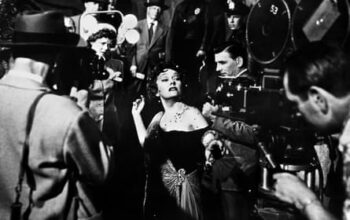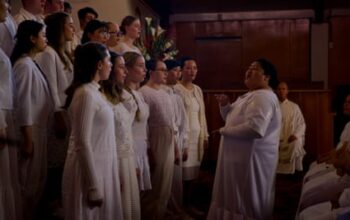Maryam Moghaddam and Behtash Sanaeeha wave from their Tehran living room: prisoners on a two-seater sofa. Outside Iran, the couple are film-makers with a growing reputation. Their new work as co-directors, My Favourite Cake, screened to high praise at this year’s Berlin film festival. Then came a successful German release. Now, the movie is coming out in the UK.
But the couple have experienced it all from this apartment, amid their bookshelves, kitchen and bathroom. We speak over Zoom, because we have to. Facing criminal charges related to the film, they are banned from leaving the country.
Moghaddam, expressive with powder-pink hair, smiles sadly. “As film-makers, this is how we have to meet the world. I am on this side of the sofa. Behtash is over there.”
Sanaeeha, bearded and genial, explains the charges. “One is breaking Islamic rules. The other is making propaganda against the regime.”
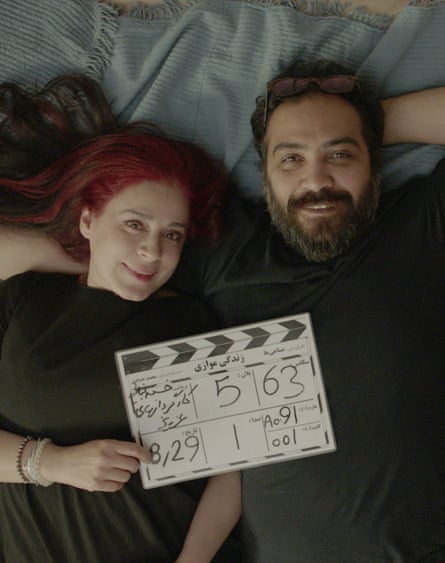
My Favourite Cake does not appear to be the stuff of subversion. A surprisingly gentle comedy, it tells the story of Mahin, a lonely 70-year-old Tehran widow. Taking action, she sets her sights on a crumpled taxi driver, Faramarz. Much of the sweet celebration of life that follows unfolds in her garden, where under a pooling night light the pair eat and talk. Later, in her apartment, they dance. The camera seems to be dancing with them. You may be tempted to join in.
Filming had already wrapped by June 2023, when Iranian security forces raided the home of the couple’s editor, Ata Mehrad. Hard drives with copies of the movie were seized. “Luckily, we had a version saved in Paris,” Sanaeeha says. He and Moghaddam packed for France, planning to edit the film there. But at Imam Khomeini International airport, they were prevented from boarding their flight. Their passports were confiscated.
Instead, Moghaddam and Sanaeeha were ordered to report to Tehran’s notorious Evin prison. They would endure a four-hour interrogation, the first of several in the coming months. “Physical torture is not used with artists,” Sanaeeha says. “But there are other threats. It is made clear they hold the power.”
The couple at least learned why the film had angered the authorities. “We show an Iranian woman drinking alcohol, and dancing with a man,” Sanaeeha says. “These were red lines.” But to the bureaucrats and enforcers of the Iranian government, worse yet was actor Lili Farhadpour appearing in multiple scenes as Mahin with her hair uncovered. “The main issue was always the hijab.”
The film was already in line to screen in Berlin. Interrogators pressed the couple to withdraw it: Moghaddam and Sanaeeha refused. They were quickly banned from film-making, or leaving Iran pending judgment on the criminal charges lodged against them. Over a year later, the ultimate verdict of the Islamic Revolutionary Court has still not arrived.
When it does, the couple expect their film-making ban to remain. The rest is less certain. Recently, their passports were returned, only for Moghaddam to have hers confiscated again, and the couple’s travel ban reaffirmed. “There could also be a tougher sentence,” she says. The word prison briefly pauses the conversation.
This is not the first time the couple have faced the blunt force of the Iranian regime. They briefly met in 1998, when they were both actors. Years passed before a second encounter. This time, they soon married. A regular on-screen presence in Iranian film, Moghaddam then starred in Jafar Panahi’s oblique 2013 drama, Closed Curtain. It was the second film Panahi made in secret after his own 20-year film-making ban. Afterwards, Moghaddam was forbidden to leave Iran for three and half years.
Later, she and Sanaeeha also became creative partners. In 2020, they co-directed their first feature: Ballad of a White Cow, with Moghaddam also starring as the widow of a man executed for a crime he did not commit. That too brought charges of anti-government propaganda, and a ban from film-making. Work on My Favourite Cake thus began with a short film permit, secured in the name of a friend.
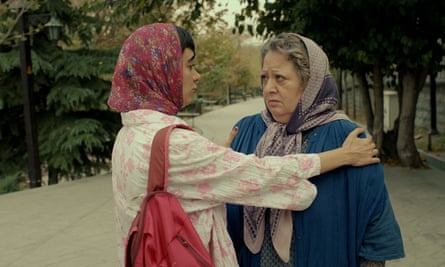
Moghaddam says the couple were clear with cast and crew about the risks of the project, before all involved reached the same decision she had with Panahi. “We chose Lili and everyone else who worked on the film for their ability. But they were also people strong enough to withstand consequences.”
That collective resolve would only harden. Filming began in September 2022. Two weeks later, Mahsa Amini, 22, died in custody after her arrest by the Tehran “morality police” for not wearing a hijab. Protests gripped Iran; the government violently cracked down. Work on My Favourite Cake stopped for two days, before a unanimous vote to continue. “This film is about life and freedom for women,” Sanaeeha says. “So we decided it was our duty to make it. Our contribution.”
The mood on the shoot of this funny, tender movie grew fraught. “Every morning we thought: today they will raid us,” Sanaeeha says. “But we were lucky.”
For all the monstrous price of protest in Iran, both film-makers now look ahead with a certain fatalism. “Sometimes you have to demand change,” Moghaddam says. “And if the only way to do that is through your work – that is how you do it.”
Two years after the killing of Amini, the couple say dissent in Iran is still brutally treated. But that brutality can also be uneven. Where acclaimed film-makers get travel bans, they explain, ordinary Iranians just disappear. And yet to their clear satisfaction, they also say a bold younger generation is not just demanding change – they are embodying it.
“People have their limit,” Moghaddam says. “In the past, I would be in public without a hijab and other women would react with alarm. Now younger women are much more courageous. So many now go out without the headscarf. And they get harassed every time, but still choose to be their real selves.”
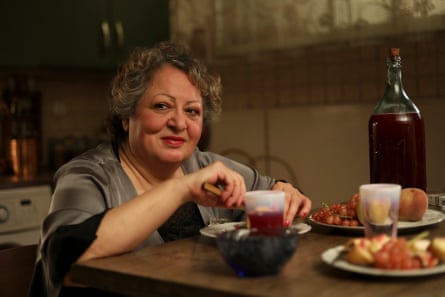
While the hijab has become a weapon of repression in Iran, Moghaddam says the film’s aim was nothing more radical than honesty. “Inside our homes, Iranians are like people anywhere. And the truth is, our character Mahin would not wear the hijab indoors. But the authorities also want us to lie in the movies.”
There is also frustration that the tyranny of the Iranian government now overshadows a film made to be universal. “Ageing and loneliness affect people worldwide,” Mogghadam says. “And they can be especially harsh for women, partly because the film industry dictates a beauty standard in which women have to be young to be interesting. That is why we wanted to tell the story of this beautiful woman of 70.”
The couple never meant to make political movies, Sanaeeha adds. “But in Iran, everything is political.”
And yet while Iranian film-makers have long been oppressed by the government, solidarity can be hard to maintain. The couple say paid informants are everywhere in a poor country. (Moghaddam says they are nicknamed “Sundis drinkers” after a local brand of orange juice used as a bribe.) Iran’s film industry is no different, they add. They believe this is probably how the police learned My Favourite Cake was being made.
“A dictatorship does strange things to people,” Sanaeeha says. “It makes them pessimistic about each other.”
But if people can be corrupted, technology can be a friend. After the seizure of the hard drives, the film was edited remotely, over Zoom. And while it will almost certainly stay banned once verdict is passed on the couple, they say Iranians will still see it with relative ease once it is pirated from western platforms.
Until then, though, there is only the limbo of waiting for judgment, here in the same apartment where, earlier this year, Moghaddam and Sanaeeha heard their film win a standing ovation 2,000 miles away at the Berlin film festival.
“One day we would love to actually share a cinema with the audience, seeing their faces as they watch the film,” Sanaeeha says. “We very much hope that can happen in the future.”
Source: theguardian.com
